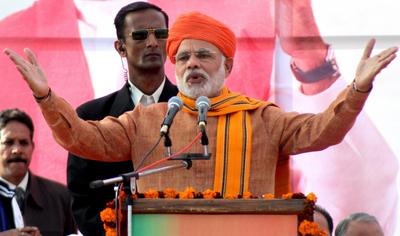The ideological position of the party is defined by cultural nationalism, with an emphasis on concepts of ‘Hindutva’, ‘territorial integrity’ and ‘unity with uniformities’. This has led the BJP to not only be perennially suspicious of Pakistan but also to oppose asymmetrical federalism with any kind of constitutional exception for the state of Jammu and Kashmir. Article 370 of the Indian constitution privileges Jammu and Kashmir as the only unit of India to have a constitution of its own, and a limited application not only of the Indian constitution but also of parliamentary legislation.
However, when the party led the NDA government from 1999–2004, it put demands to abolish Article 370 on the back burner and adopted a proactive role in officially recognising the Kashmir dispute and institutionalising the peace process. Under the leadership of Atal Bihari Vajpayee, the BJP took unprecedented initiatives to initiate dialogue both with Pakistan and with Kashmiri separatists. It dealt with alienation in Kashmir and put in place a number of confidence building measures including a ‘free and fair’ election. It is in appreciation of the progress made during the NDA’s time that, despite the ideological position of the BJP, Vajpayee is remembered in Kashmir as one of the most dynamic Indian prime ministers.
Yet the NDA government fell in the 2004 elections. And the BJP not only went back to its original position of opposing Article 370 but also disowned the peace process initiated by Vajpayee. Especially after the Mumbai terror attack, the BJP adopted a very offensive approach vis-à-vis Pakistan and Kashmiri separatists — becoming staunchly critical of any move of the UPA government to resume the peace process.
It was because of the BJP’s aggressive posturing that Manmohan Singh’s government could not take the peace process beyond the opening of routes for people-to-people movement and trade purposes across the Line of Control.
So, as it prepares to form government, the BJP under Modi’s leadership stands between two conflicting positions — the traditionally hard and non-negotiable position of ‘party in opposition’ and the ‘Vajpayee line of peace’ position upheld during the NDA government. During his two visits to the state of Jammu and Kashmir recently, Modi used the Vajpayee mantra of ‘Insaniyat, Jamhooriyat and Kashmiriyat’ (‘humanity, democracy, and Kashmiri ethno-national consciousness and cultural values) to deal with the Kashmir issue.
Modi has also abstained from recommending the abolition of Article 370. Instead he has called for debate on the benefits of this article for Jammu and Kashmir’s citizens. Rather than taking the traditional BJP ‘nationalistic’ stance on Article 370 — that it threatens India’s sovereignty — he has used the language of rights and citizenship to critique the special constitutional status of the state.
Still, Modi also has a reputation of having a hardline position on Pakistan and Muslims. This stems not only from his handling of the 2002 Gujarat riots but also his views on various issues related to national security, which project him as an inflexible leader. So what direction will the peace process take once the BJP is put in power and Modi is at the helm of affairs? This is a difficult question to answer.
On the part of the Kashmiri leaders, both mainstream and separatist, there is disillusionment with the ten years of NDA government — especially the leadership of Manmohan Singh with regard to the peace process. The leaders have expressed hope that the BJP, once in power, may take the process forward from where Vajpayee left off and that Modi may prove to be another Vajpayee. A stable government under a strong leader may be able to deliver things better on the ground.
However, there are many who point out that Modi is no Vajpayee and he has not shown much creativity to offer ‘out of the box’ ideas when dealing with Kashmir and Pakistan the way Vajpayee had done. Vajpayee was an exception — not only within the BJP but also among Indian leaders — who could give an altogether new direction to the conflict resolution process and carry the nation along with him.
Modi may not be Vajpayee but he carries the legacy of Vajpayee. This legacy, it can be hoped, would not only provide him a roadmap to follow but would also become an obligation and responsibility for him and his party.
Rekha Chowdhary is an Indian Council of Social Science Research National Fellow, University of Jammu.

